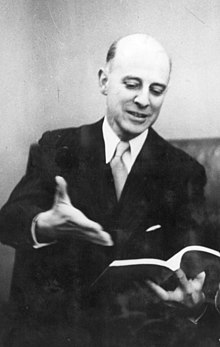Chilean nationalism
[9] This book contains three principal ideas: that Chilean miscegenation had given rise to a permanent and defined race, composed of both the Mapuche, an American Indian particularly suited to war and the hostility of the climate; as well as by Spanish conquistadors of Germanic descent, whose warrior skills were also highlighted by the author,[10] that Chilean territory, contrary to the reports that were provided, was mostly unusable given its amount of sterile land, so immigration policies had to be even more selective and prevent the entry of "Latin races", in order to favor the entry of Germans and other "Nordic" ethnicities,[11] and that much of the crisis they faced was related to the poor image that the people had of themselves, an issue accentuated by the "dominant oligarchy", which "mercilessly despised" the lower class.
[12] The racial theories of Palacios influenced the prolific historian and philosopher Francisco Antonio Encina,[13](National Literature Prize, 1951), one of the founding members of the Nationalist Party in 1910.
For the historian, the decadency of the Chilean elite originated with the triumph of the liberals in the Civil War of 1891 and the implementation of anti-state policies of liberal economist Jean Gustave Courcelle-Seneuil, which consisted of lowering tariffs and allowing the entry of foreign products and companies, resulting in a “decline of the national entrepreneurial spirit and the surrender of the country to large foreign companies”.
This work was strongly influenced by The Decline of the West by German philosopher Oswald Spengler, who he cited and studied; the investigators Renato Cristi and Carlos Ruize define Edwards as a "conservative-revolutionary" thinker.
With Augusto Pinochet in power, the main nationalist intellectual production was the Avanzada magazine (which later became a political party of the same name), the Center for National Studies directed by Lucia Pinochet (daughter of the dictator) and the publication of the historical essay on the notion of the State in Chile in the 19th and 20th centuries, a fierce criticism of the turn towards neoliberalism that the military junta had taken in Chile, reaffirming Chilean nationality in the strength of the State.
This book was written by Mario Góngora, who died three years after its publication after being run over by a motorcycle in an incident outside the San Joaquín Campus of the PUC .
Currently, academics Daniel Chernilo, Axel Kaiser, Benjamin Ugalde and Felipe Schwember name the existential philosopher Hugo Eduardo Herrero (b.
Its main members were Alberto Edwards Vives, Francisco Antonio Encina, Luis Galdames, Tancredo Pinochet, and Guillermo Subercaseaux.
Subercaseaux wrote the pamphlet Los ideales nacionalistas ante el doctrinarismo de nuestros partidos políticos históricos (1918) that summarized the main ideas of the party.
Although the party was not a success in terms of policy change or electoral impact, save for the election of Subercaseaux as a representative in 1915–1918, it marked the beginning of the nationalist movement of Chile.
After the massacre, the leadership of the National Socialist Party (commanded by Jorge González von Mareés) turned sharply to the left, approaching the Popular Front of Pedro Aguirre Cerda.
[27] The group also included former supporters of defunct President Carlos Ibáñez del Campo (Ibañistas) and former members of the National Syndicalist Revolutionary Movement (Movimiento Revolucionario Nacional Sindicalista, MRNS), that doesn't had legal existence, and therefore had difficulties to compete in elections.
[28] The Nationalist Fatherland and Liberty Front (FNPL), also known only as Patria y Libertad (PyL), was a Chilean paramilitary organization of extreme right-wing, fascist[29] and ultra-nationalist[30] ideology formed on April 1, 1971, to oppose through political violence, sabotage and terrorism the socialist government of Salvador Allende and the Popular Unity.
In July 1973, it received orders from the Chilean Navy, which opposed the Schneider Doctrine of military adherence to the Constitution, to sabotage Chile's infrastructure.
This group is focused on the publication of authors such as Alain de Benoist, Alberto Buela or Diego Fusaro, and on the dissemination of ultra-nationalist, ultra-conservative and national-populist ideas.
Rivas ends up being expelled from the People's Party after promoting the election of Karol Cariola - whom the "social-patriots" had harassed years before -[38] as president of the Chamber of Deputies of Chile, and his current relationship with nationalism is not clear.





